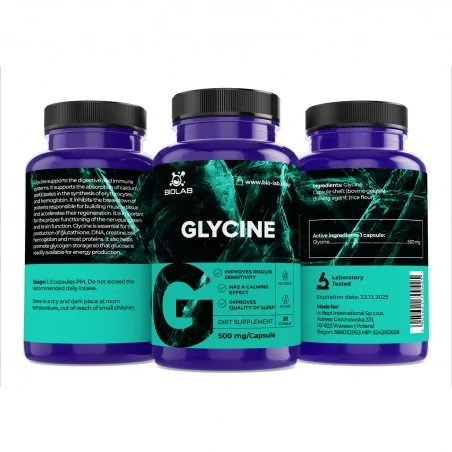
GLYCINE 500mg
Product code:
Buy 3 and get 3% discount
Buy 5 and get 5% discount


Product code:


















GLYCINE 500mg
Glycine is the most important component that forms collagen - the main component of connective tissue, which includes bones, cartilage, tendons, ligaments and teeth. 
Benefits
Glycine, an essential amino acid, occupies a key position in human health due to its multifaceted role in various physiological processes. As a non-essential amino acid, glycine can be synthesized endogenously; however, its presence in the diet is equally important for meeting the body's diverse needs.
As an integral part of proteins, glycine is found abundantly in a variety of food sources. Understanding the diverse natural sources of glycine is essential to creating a balanced diet:
1. Meat and poultry: Sources rich in glycine include various meats such as pork, chicken, turkey and beef. In particular, collagen-rich tissues, such as the skin and cartilage in these meats, contain extremely high levels of glycine.
2. Fish and seafood: Seafood enthusiasts can enjoy glycine in fish such as salmon, tuna and shrimp, which are delicious sources of this valuable amino acid.
3. Bone broth: The time-honored preparation of bone broth involves simmering bones and connective tissues, yielding a concentrated and highly bioavailable source of glycine.
4. Dairy products: Milk, yogurt and cheese, in addition to being sources of calcium and protein, also provide moderate levels of glycine.
5. Legumes and beans: Plant-based eaters can consume glycine from legumes such as soybeans, beans and black beans.
6. Spinach and kale: Green leafy vegetables such as spinach and kale add a little glycine to a plant-based diet.
While a well-balanced diet can meet the need for glycine, targeted supplementation can provide specific health benefits. Research has shed light on the potential benefits of glycine supplementation, confirming its effectiveness with a number of clinical studies:
1. Improving sleep quality: Numerous studies have examined the role of glycine in improving sleep quality. A notable study published in Sleep and Biological Rhythms (2019) found that glycine supplementation improved sleep quality and reduced sleep disturbances in people with sleep problems.
2. Cognitive function support: The brain-beneficial properties of glycine have been investigated, suggesting its potential neuroprotective role. An interesting study published in the Journal of Neurochemistry (2017) found that glycine supplementation improved cognitive function in aging mice. Cognitive function is crucial to all aspects of life.
3. Antioxidant properties: The antioxidant potential of glycine has been examined in studies demonstrating its ability to combat oxidative stress. A study published in Amino Acids (2018) showed that glycine supplementation reduced markers of oxidative stress in healthy people.
4. Exercise performance and muscle recovery: Athletes and fitness enthusiasts may appreciate glycine's contribution to exercise performance and muscle recovery. A study in Amino Acids (2020) showed increased exercise performance and reduced muscle soreness in trained athletes with glycine supplementation.
Glycine is involved in various critical functions:
1. Protein construction: Glycine is an essential component of various proteins, including collagen, enzymes and several structural proteins.
2. Neurotransmission: Glycine acts as an inhibitory neurotransmitter in the central nervous system, essential for motor control, pain sensation and cognitive processes.
3. Glutathione synthesis: Glycine's important role as a precursor to glutathione, the body's main antioxidant, protects cells from oxidative damage.
4. Creatine synthesis: The involvement of glycine in creatine synthesis contributes to energy production in the muscles, promoting exercise performance.
5. Bile acid conjugation: Glycine's important role in bile acid conjugation facilitates fat absorption and digestion, optimizing nutrient absorption.

Your review appreciation cannot be sent
Report comment
Report sent
Your report cannot be sent
Write your review
Review sent
Your review cannot be sent
Customers who bought this product also bought:
BERBERINE
TART CHERRY 500mg
BRONCHOGEN 20mg
YOHIMBINE HCL 100caps/5mg
JOINT LIVER SUPPORT 350mg
5-HTP 100mg/capsule
ALPHA GPC 300mg/kapsulka
N-ACETYL SELANK 10mg
Newsletter
SIGN UP AND STAY UP TO DATE!
We specialize in wholesale and retail supply of high quality peptides.
Category
Our company
Add to wishlist
((title))
Sign in
You need to be logged in to save products in your wishlist.